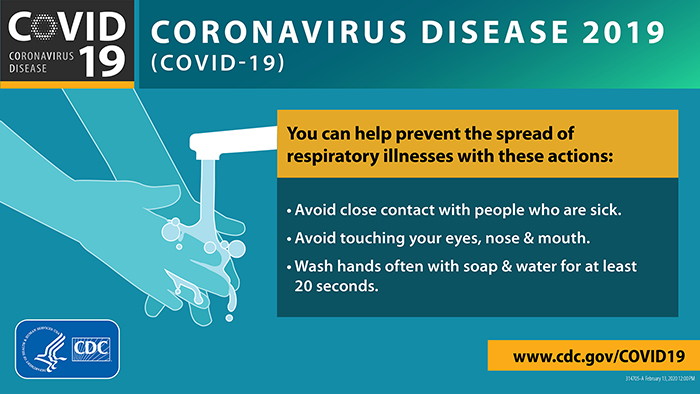A notorious virus has spread throughout the entire world, COVID-19. With the reports of cases appearing in Maryland, and Gov. Larry Hogan calling a state of emergency on March 5, students and staff at Frederick Community College are taking as much precaution as possible to prevent getting infected.
FCC is closed to students from March 16 to March 27. No students should be on the main campus or the Monroe Center. Faculty will communicate with their students through Blackboard and email, according to Provost Tony Hawkins.
In an email, Hawkins offered the following guidance to faculty: “This is not an ideal way to learn about distance education or implement new ideas. Keep in mind that this is a solution to the challenges we are facing – our expectations need to adjust and be reasonable given the situation. There is no expectation of faculty to convert the remaining semester’s coursework to an online format. Just look at the content of the next two weeks, keeping the instructional activities simple to cover the learning outcomes of the class.”
As of March 15, the college is closing for 11 days. Provost Tony Hawkins wrote in an email on March 11 that while news continues to evolve, guidance from the Frederick County Health Department and the Centers for Disease Control recommends, “Higher education institutions are to review, update, and implement emergency preparations, exercise preventative measures such as staying home when sick, covering coughs and sneezes, cleaning frequently touched surfaces, and washing hands.”
On Friday, March 6, students got an email from Kristi Mills, the assistant director at the Center for Student Engagement, titled “Novel-Coronavirus COVID-19 Information.” The email informed students of the lengths the college will take in order to keep the community safe.
“We are partnering with the Frederick County Health Department and actively preparing for any potential health emergency in our community that would affect College operations” Mills writes. “Members of our Operations Team have been working diligently in disinfecting common touch surfaces, such as push bars, doorknobs, etc., as part of their standard cleaning procedures.”
Max Fiedler, a student at FCC, said this about the preventive measures in the email: “It is a smart idea to do, though it can be time consuming and can use extra resources,” he says.
The email comes attached with a poster informing the viewer how to stop the spread of germs. This includes washing your hands for 20 seconds, and not touching your eyes, nose, mouth or others.
Shivum Patel, another student at FCC, added more helpful advice. “Make sure no one sneezes on you or coughs on you,” he says. “I think the best way to do it is to keep a healthy routine on your hygiene, you know, brush your teeth, take a shower every day, just normal everyday stuff.”

